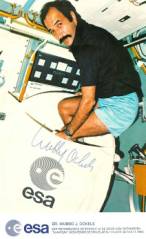The Announcement by ESA Astronaut Wubbo Ockels which encouraged us to apply at ESA:
Dear European Student,

Throughout nearly 40 years of manned space flight, only relatively few of us astronauts and cosmonauts have been privileged enough and have been lucky enough to experience the weightlessness in space.
Weightlessness is very different from Earth. Here everything is continuously under the influence of 1g (10 m/s2). Not only do we need our legs to move, but also all things on a table stay where they are because of gravity. Nature could not live without gravity, how would trees and plants know where to grow to, if there would be no gravity and no up and no down? Gravity is so fundamentally intertwined with everything around us and inside us, it goes deeply into basis processes of life and production of goods, e.g. biological processes on cellular level, production of high quality alloys etc. That is the reason why being able to study these processes in weightless is so exciting and valuable. Only by making experiments in weightlessness, we can learn about the influence gravity has on Earth. Isn’t that something?
Space research is a prerequisite for our survival, we need to learn how dependent we are from our Earth, we need to look beyond our present horizon.
When giving these convincing arguments it seems quite understandable that some people ask, why has there not been so exciting results form the space research (officially called "micro-gravity" research) that all papers have it on the front-page? The real good answer is: "space is so different that we still are in the process to learn how to look". We are often still looking too much in the Earth way, but it is changing rapidly now. Breakthroughs are there, for example in producing large crystals form enzymes that allow much better study of their structure and function. The upcoming international space station, in which America, Canada, Europe, Russia and Japan are working together, will give us a large permanent weightlessness laboratory for the next decades. Sure we will see headline news in the near future and you will be witness of this.
But witness is not good enough, we want you to be really involved.
The European Space Agency is committed to encourage the youth of Europe to actively prepare for, and participate in, the building of their future through a better knowledge of (space) technology and sciences, with the aim of ensuring an appropriately skilled workforce into the 21st century.
That sounds maybe heavy and formal, but it really means that there are opportunities made for you.
Maybe it is one of your brilliant experiments getting fundamentally new and exciting results…and making it to the front-page news.
For being weightless you need to be in free fall. In space you are continuously in free fall. But each time you have fallen a little closer to the Earth you have gone such a distance (the Space Shuttle goes 27000km/hour) that the curvature of the Earth has been going away from you just as far as you have fallen, you stay at the same altitude, you keep circling around it. But you don’t need to go to space to become weightless. A coin that falls from the table is half a second weightless till it hits the ground. A bungee jumper can be some 2-3 seconds in free fall.
The next best to being in space is being in a falling aeroplane. Europe has a special "parabolic" flight aeroplane, the Airbus 300 zero-g. So, the remaining question is: So how to get you on board? It is a therefore a great pleasure for me that our European Space Agency is organising parabolic flight campaigns dedicated to student on an annual basis. Here is your chance to have the real weightless experience also for you. So make sure you sign in as soon as possible and follow all the instructions and try to get on board of the Airbus 300 zero-g aircraft in the fall with a real good experiment. Although the period of weightlessness isshort, 20-25 seconds per parabola, many really good experiments can bedone in this time, while you can , when you properly relax, experience the exact same feeling as astronauts have in space.
But there is even more.
Our director that is responsible for Europe’s part in the International Space Station Mr. Feustel-Beuchl has agreed to look for further opportunities for those students with the very promising experiments. He has offered twice a year an opportunity for a student experiment to fly with the Professional Parabolic Flight Campaign. So, for a few very promising experiments, we will open the door to go a step further. Eventually we hope that we can even open the door to the Space Station itself and have the most promising experiment really in space!!
I hope to see many of you floating in weightlessness in July 2001 in Bordeaux.!
Wubbo J. Ockels
Dutch Astronaut (D-1 Spacelab)
Head of Office
ESA Office for Educational Projects Outreach Activities